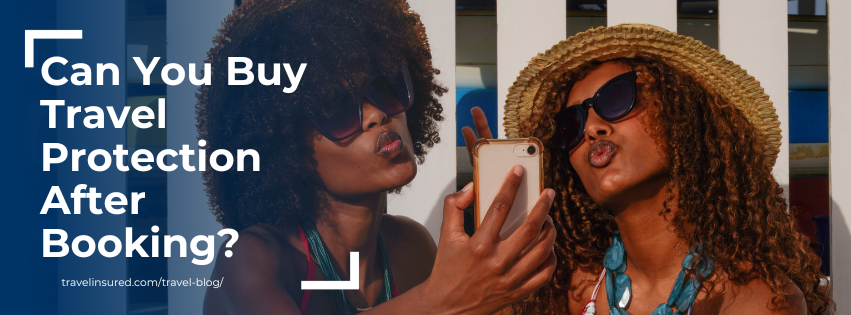by
Haley Dobrowski
| May 16, 2024

Learn when and how to purchase travel protection after booking your trip. This guide covers the benefits of early and later purchases, highlighting the optimal timing on coverage for unexpected events.
Traveling often involves a significant financial investment, from securing airfare to booking accommodations and planning excursions. As with any investment, there’s a level of risk involved, especially when unforeseen circumstances like illness, severe weather, or other disruptions come into play. This is where travel insurance becomes a great asset to have in your back pocket, offering added peace of mind and financial protection. But a common question arises: Can you buy travel insurance after booking your trip? Let’s dive into this topic and discuss the optimal timing for purchasing protection.
Travel Protection After Booking: Is It Possible?
The simple answer is yes, you can indeed purchase travel insurance after you have already booked your trip. Most travel insurance providers offer the flexibility to buy a plan at any time prior to the start of your trip. This flexibility is beneficial for travelers who may have initially overlooked the importance of insurance or those deciding last minute that they want additional security for their travel investment.
Why Consider Travel Protection?
Before exploring the timing, it’s important to understand why you might need insurance for your next trip. Travel insurance can cover a range of elements including trip cancellations, medical emergencies, travel delays, and lost luggage. Each plan varies, so it’s crucial to read the terms and conditions to know what’s included and what’s not.
Buy Travel Protection After Booking a Flight
Purchasing travel protection after booking a flight is not only possible but also quite common. Many travelers opt to book their flights and then consider the need for insurance afterward. While this practice is generally acceptable, it's generally beneficial to purchase your protection sooner rather than later.
Immediate Benefits of Early Purchase
Some benefits of travel protection, like coverage for pre-existing medical conditions, often require you to purchase the plan within a specific time period after making your initial trip deposit—sometimes within 10 to 21 days. Waiting too long to buy insurance could mean you miss out on these benefits.
When Should You Buy Travel Protection?
The best time to buy travel protection is typically within a few days of making your initial trip deposit. This ensures you have the full spectrum of benefits offered by the protection plan. However, if you missed this window, it’s still better to buy protection late than not at all.
Considerations for Last-Minute Insurance
If you’re considering purchasing travel protection close to your departure date, keep in mind the following:
- **Limited Coverage**: Some plans may limit coverage or exclude certain benefits if purchased too close to the travel date.
- **Lookout for Waiting Periods**: Certain benefits might have waiting periods that affect how soon the coverage starts.
Common Scenarios for Delayed Purchase
Many travelers delay purchasing travel insurance for several reasons:
1. Uncertainty About Details: Often, travelers wait to buy protection because they have not yet finalized their travel dates, destinations, or itineraries. Planning a trip can be complex, involving many variables, and some travelers prefer to wait until they have a clearer picture of their journey before committing to insurance. This can be practical but risky, as it may limit the availability of certain benefits like Cancel for Any Reason (CFAR) coverage.
2. Overlooking the Importance: Travel protection can sometimes be an afterthought. Initially, travelers may focus more on the exciting aspects of trip planning such as booking flights and accommodations or planning activities. The importance of insurance is often realized only when they consider the potential financial losses from cancellations, emergencies, or unexpected events, which prompts a later purchase.
3. **Budgeting Constraints**: For some, travel protection is seen as an additional expense rather than a necessary safeguard. Budget constraints can lead travelers to prioritize spending on immediate travel needs such as lodging, transportation, and activities. As a result, they might postpone buying insurance until they feel more financially comfortable, which could be closer to the departure date.
Regardless of when you choose to purchase, the key is ensuring you have adequate coverage based on your specific travel needs.
Proactive Planning
To fully protect your travel investment, consider purchasing travel protection at the time of booking. This proactive approach can not only enhance your coverage options but can also bring you some peace of mind as you prepare for your journey.
Whether you're planning a quick business trip or an elaborate global adventure, understanding the dynamics of when and how to buy travel protection can significantly impact your travel experience. Remember, the goal is to safeguard both your financial investment and your well-being while away from home.
As the travel landscape continues to evolve, staying informed and prepared will help you navigate your trips more successfully. So next time you book a trip, consider aligning your travel protection purchase closely with your booking activities to maximize benefits and minimize stress. Learn more by talking to your travel advisor or visiting our website today!
20240516-3575752